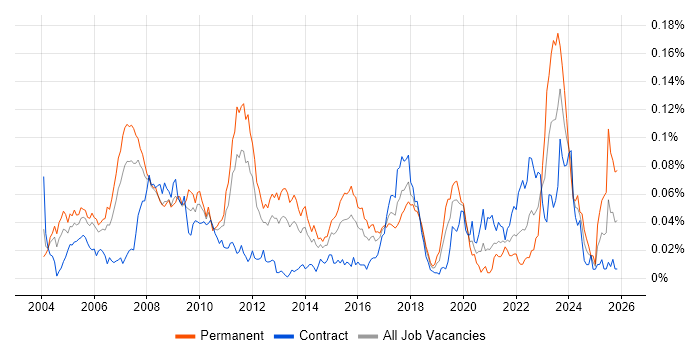Java Quant Developer
England > London
The median Java Quant Developer salary in London is £125,000 per year, according to job vacancies posted during the 6 months leading to 6 September 2025.
The table below provides salary benchmarking and summary statistics, comparing them to the same period in the previous two years.
|
|
6 months to
6 Sep 2025 |
Same period 2024 |
Same period 2023 |
| Rank |
364 |
441 |
456 |
| Rank change year-on-year |
+77 |
+15 |
+403 |
| Permanent jobs requiring a Java Quantitative Developer |
11 |
12 |
52 |
| As % of all permanent jobs advertised in London |
0.092% |
0.063% |
0.22% |
| As % of the Job Titles category |
0.10% |
0.066% |
0.23% |
| Number of salaries quoted |
7 |
3 |
32 |
| 10th Percentile |
£118,000 |
£33,700 |
£102,500 |
| 25th Percentile |
£122,500 |
£52,000 |
£105,000 |
| Median annual salary (50th Percentile) |
£125,000 |
£85,000 |
£177,500 |
| Median % change year-on-year |
+47.06% |
-52.11% |
+20.34% |
| 75th Percentile |
£137,500 |
£103,750 |
£200,000 |
| 90th Percentile |
£150,000 |
£113,500 |
- |
| England median annual salary |
£125,000 |
£85,000 |
£177,500 |
| % change year-on-year |
+47.06% |
-52.11% |
+20.34% |
For comparison with the information above, the following table provides summary statistics for all permanent IT job vacancies in London. Most job vacancies include a discernible job title that can be normalized. As such, the figures in the second row provide an indication of the number of permanent jobs in our overall sample.
| Permanent vacancies in London with a recognized job title |
10,881 |
18,262 |
22,190 |
| % of permanent jobs with a recognized job title |
91.26% |
95.38% |
95.17% |
| Number of salaries quoted |
7,078 |
11,940 |
18,134 |
| 10th Percentile |
£37,500 |
£40,000 |
£41,250 |
| 25th Percentile |
£52,500 |
£52,000 |
£53,750 |
| Median annual salary (50th Percentile) |
£72,500 |
£72,500 |
£72,500 |
| Median % change year-on-year |
- |
- |
+3.57% |
| 75th Percentile |
£96,250 |
£95,000 |
£95,000 |
| 90th Percentile |
£120,000 |
£118,750 |
£115,000 |
| England median annual salary |
£55,000 |
£55,000 |
£60,000 |
| % change year-on-year |
- |
-8.33% |
- |


